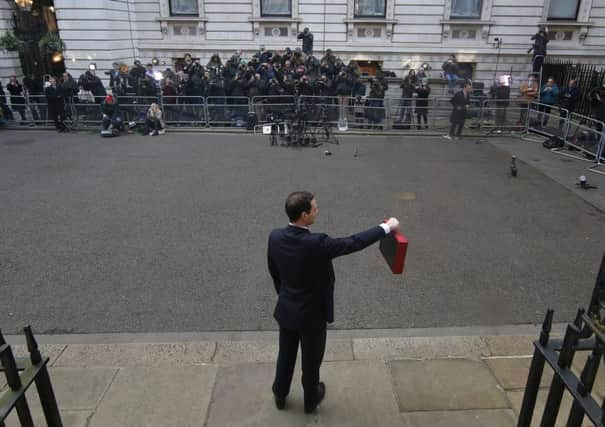Jeff Salway: 4 key areas Osborne could spring Budget surprise


George Osborne had been expected to unveil the outcome of a consultation on proposals to overhaul the current system of pensions taxation. That announcement, which could have seen tax relief on pensions either moved to a flat rate or scrapped entirely, has been put back due to fears of a backlash affecting the outcome of the EU referendum.
The Chancellor is also restricted by his failure to hit either his growth or borrowing targets. But there are still several options open to him.
Advertisement
Hide AdAdvertisement
Hide AdHere, our experts offer their predictions on possible changes in four key areas:
PENSIONS
A shake-up of pensions tax relief was the main focus leading up to the 2016 Budget – until the Treasury indicated last week that those reforms would be parked for the time being. But change is still coming once the EU referendum is out of the way, said Richard Libberton, private wealth manager at Anderson Strathern Asset Management.
“The generous tax reliefs offered under the present pensions system is unsustainable in the long run. I do expect him to change tax relief on pensions and he is running out of time to get this through before campaigning season in the run-up to the next election.”
More likely is an end to salary sacrifice, where employees can give up part of their salary in exchange for other benefits, such as extra employer pension contributions. Employers don’t need to pay national insurance contributions (NICs) on sacrificed salaries, an exemption that costs the Treasury some £15 billion a year.
Shirley McIntosh, tax partner in Edinburgh at RSM Tax and Accounting, said: “The government remains concerned about the growth of these types of arrangements and may be considering an attack in this area.”
The amount high earners can save into a pension each year and get tax relief – the annual allowance – may be reviewed again. From 6 April, 2016, the £40,000 a year allowance will be reduced by £1 for every £2 of income received over £150,000.
“This limit could well come down to a lower figure than £150,000, which will reduce the ability of those higher earners to continue to benefit from tax relief,” said Libberton.
CAPITAL GAINS TAX (CGT)
CGT is currently paid at 18 per cent (basic rate taxpayers) and 28 per cent (higher rate taxpayers). But its exemption from the so-called tax-lock – which bars the government from raising income tax, NIC and VAT rates during this Parliament – makes an increase a distinct possibility.
Advertisement
Hide AdAdvertisement
Hide Ad“This provides the Chancellor with an opportunity to revert back to the pre-2008 regime of aligning the capital gains tax rates with income tax rates,” said Vishal Chopra, head of tax at Grant Thornton Scotland.
“At the highest level, this could increase the capital gains tax rate from 28 per cent to 45 per cent and would have a significant impact upon those that realise substantial capital gains.”
Elaine McInroy, tax specialist at accountants Saffery Champness, said: “With pension tax relief not being reviewed at this time, where will he get extra tax revenue from? Possibly an increase in CGT tax rates to align with top income tax rates or a cut back on reliefs, particularly entrepreneurs relief.”
Entrepreneurs relief allows someone selling a qualifying business to get a CGT rate of 10 per cent on gains up to a lifetime limit of £10m, rather than the main CGT rate of 28 per cent. Some 43,000 people claimed entrepreneurs relief in 2013/14, totalling £2.9bn (£2bn more than predicted).
“The government has consulted on proposals to prevent profits retained within a company from benefitting from entrepreneurs relief on a winding up, instead taxing these at the new higher dividend rates of up to 38.1 per cent,” said McIntosh at RSM.“It is widely expected that the Budget will bring in these restrictions in from 6 April, 2016.
INCOME TAX
The 2015 Budget featured a commitment to lifting the rate at which people begin paying higher rate tax. The threshold rises to £43,000 on 6 April, but an acceleration in the rate of increase could be his headline giveaway for “middle England”.
There may also be an announcement on reform of national insurance (NI), after an Office of Tax Simplification (OTS) review on merging it with income tax said the current system was “not fit for purpose”. The OTS recommended aligning NI with income tax, rather than merging the two. The Budget may include the government’s response to the report.
INHERITANCE TAX
Osborne is under pressure to review the planned April 2017 introduction of a main residence nil rate band of Inheritance Tax (IHT), which would raise the IHT-free threshold for homeowners to £500,000 a person (£1m for married couples meeting certain criteria).
Advertisement
Hide AdAdvertisement
Hide AdThe plans have been criticised by the Treasury Select Committee as “impenetrable to all but professional tax advisers”. The measure will cost the government £1bn by the end of parliament, according to the Labour party.
“This is an extremely complex measure and one that will benefit only a small, but increasing, proportion of society,” said Chopra. “We should not be surprised if this proposal is scrapped, or instead other IHT reliefs – taper relief or business property relief – are amended in order to balance the books.”